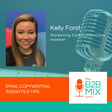Become a Creator today!Start creating today - Share your story with the world!
Start for free
00:00:00
00:00:01

A Conversation about Crisis Marketing
Jeremy Miller of Sticky Branding joins us to talk about crisis marketing during the COVID-19 pandemic. Jeremy has three critical questions business owners and marketers should be asking themselves. We cover these questions and more during our conversation.
Want to connect with Jeremy online? Catch him at any of the following sites:
--
About The B2B Mix Show:
The B2B Mix Show with Alanna Jackson and Stacy Jackson is brought to you by Jackson Marketing. Need help with your B2B online presence? Let's talk!
Connect with us on social media:
The B2B Mix Show -- Twitter, Instagram, LinkedIn, Facebook
Transcript
Introduction to the B2B Mix Show
00:00:00
Speaker
Welcome to the B2B Mix Show with Elena and Stacey. In each episode, we'll bring you ideas that you can implement in your sales and marketing strategy. We'll share what we know along with advice from industry experts who will join us on the show. Are you ready to mix it up? Let's get started.
Meet the Hosts: Elena and Stacey Jackson
00:00:19
Speaker
Hey everybody, this is Stacey Jackson. And I'm Elena Jackson. We are the co-founders of Jackson Marketing. And in case you still haven't heard, we are also sisters. Stacey, what are we talking about today?
Crisis Marketing Amidst the Pandemic
00:00:31
Speaker
Well, we've got a little bit of a kind of serious topic for everyone out there. We're talking about crisis marketing, which of course is in response to all the businesses out there dealing with this pandemic.
00:00:46
Speaker
Yeah, I think a lot of businesses and just people in general are finding things to be a little out of their norm, obviously, because this is a pandemic, but you're having to make a lot of changes and you have to be flexible in the things that you're doing because you can't do things the way you've always done them, right?
00:01:05
Speaker
Right.
Guest Introduction: Jeremy Miller
00:01:06
Speaker
And this week we've got a guest who has been helping his customers try to switch gears and deal with this pandemic a little better. Elena, why don't you introduce today's speaker? Yeah, I'd love to do that. If you're a regular listener of the B2B mix show, then you probably already met Jeremy when he joined us earlier in the year to talk about how do you find a brand new name.
00:01:29
Speaker
But if you missed that episode or you're a new listener, let me introduce you. Jeremy Miller is a brand strategist, author, speaker, and the founder of Branding Building Agency. Sticky branding.
00:01:42
Speaker
Jeremy entered the world of branding out of necessity. His family's business had nearly hit rock bottom, so he was forced to review and rethink how his company was run. Jeremy found that the issue wasn't with the sales team, nor was it with the marketing process. The issue came down to the brand. His company's customers didn't distinguish his company from the competition.
00:02:04
Speaker
Jeremy worked to reposition and rebrand the business successfully, propelling it into growth mode. By 2013, he sold his family's business to focus exclusively on building brands. Jeremy embarked on a decade-long study of how companies grow recognizable, memorable brands. He and his team at Sticky Branding have interviewed hundreds of companies across several industries to discover how companies grow sticky brands.
00:02:29
Speaker
Jeremy is the author of sticky branding and brand new name. Jeremy, welcome back to the B2B mix show. It is a pleasure to be back. Thank you so much for having me and what a surreal time that we are all living in right now. I know a lot has changed since the last time you were on the show.
Adapting to Revenue Challenges
00:02:47
Speaker
I know COVID was starting to rear its head in other parts of the world, but how is your business doing right now in the midst of all this pandemic chaos?
00:02:57
Speaker
Well, it feels like when we talked last, uh, just, it's this, this strange dividing line of BCAC before coronavirus after coronavirus. And so it's, it's, it's very different. Uh, sticky branding is, is doing incredibly well. Uh, I had a very visceral response to the crisis. I grew up in a family business that was in the recruiting sector and we went up and down with the economy. And so when the lockdowns came to North America,
00:03:27
Speaker
I could quickly see that we're being thrown into a recession and so we moved to advise our client to say look you might be seeing a decline in revenue this year by fifty percent sixty percent if not more and so how you respond now matters.
00:03:44
Speaker
And so we created a program or a set of services that are really focused on how to find and replace revenue taken by COVID. And like I say, it's some of the most meaningful work I've ever done. And so we're busier than ever and really working with a lot of business owners on this.
00:04:01
Speaker
Great. And before we dig into some of the questions I know that you want marketers to ask themselves as part of that crisis marketing, what is your advice to people to get themselves in the right mindset? There's probably still some people who are kind of struggling or panicking even and panic can derail
00:04:22
Speaker
the best of us. So what should people do to quell that panic and get in the right mindset to tackle the critical questions that they need to be asking themselves to move forward with crisis marketing?
Psychological Impact and Mindset During the Pandemic
00:04:36
Speaker
Great question, Stacey. This is such a complicated moment in time because unlike previous recessions that were either economic or stock market related, this is a health crisis. So not only do we face a business problem, we are facing a psychological problem because people are genuinely scared.
00:04:57
Speaker
It feels like it's a fight for survival for many of us it's a fight for our business to fight for our lives were afraid to go out and all this fear psychology really is taking a toll so the mindset that we have to have is going to vary depending on.
00:05:16
Speaker
where you are, what's the state of your business, what are your options. But what I'm genuinely seeing is that, uh, the companies that are the most helpful, the ones that changed their mindset to think, you know what, there is a world of need out here. We might not have the same needs that existed before coronavirus, but people need our help right now are finding it a lot easier to navigate the crisis because they can figure it a way of being of service versus trying to sell stuff.
00:05:45
Speaker
Yeah, I think, um, you know, you were talking about the, like the mindset and like for me, I sometimes feel like I'm okay, but then I'll notice I'll just start eating something and I'm like, okay, I'm obviously stressing. I don't know what's going on. But I think some of us also think that, you know, we're good, but then we will do certain things or we'll feel very antsy. And it's like maybe in the back of our minds, our mindset really isn't where it needs to be.
00:06:11
Speaker
I agree. I can tell you physically the toll of the last seven weeks are on me, like the stress, the tension, sitting in front of countless Zoom meetings and then turning on the news and having my anxiety spike. It's a perpetual state of fight or flight.
00:06:30
Speaker
while we may be able to cope well with this, um, this is a, is a surreal moment. And I think we have to be really gentle with ourselves, um, because how else are we going to get through it? We all have to rely on each other. Right. Right. It's definitely something that like you hear a lot of people saying we're in this together and it's true. We are all in this together. We're all experiencing in different ways, but the same thing. Mhmm.
00:06:58
Speaker
So Stacey mentioned some questions that you feel like we as owners and marketers, business owners and marketers, we really need to be focused on right now. And there's three main questions that we want to talk about today. And so one of the first questions that you've mentioned is,
Identifying and Serving the Most Needy Clients
00:07:15
Speaker
The question is who needs your company and its expertise the most right now. So that's the first question we want to kind of focus on. So do you think, do you expect people to have a different answer now than what they may have had before this whole coronavirus situation started? Oh, a hundred percent. Let me ask you, when you look at your clients and the state of their businesses right now, what kind of conversations are you having with them?
00:07:46
Speaker
And definitely different ones. Yeah, for sure. A lot of people still want to say, how are we going to get leads? But a lot of times it's just how do you even just...
00:08:00
Speaker
How do you? Hold on to the people that you already have and keep those relationships going. And how to find replacement. Sorry, Lynn, go ahead. No, sorry. And I was just gonna say, and how do you sell at a time like this when you know that they're losing their jobs and people are in such a dire state right now. I think there's just some feeling of feeling lost on what to do. And that's why I think that question is so powerful.
00:08:29
Speaker
which is where can you use your expertise, your resources, your products, your services? How can you be of service right now? And I think what we're really trying to look at is we need to be creative. The needs have absolutely shifted in an after coronavirus world and they are continuing to shift.
00:08:49
Speaker
We're actually going to be seeing a whole new suite of business needs emerging in the next two months as companies emerge from the lockdown and are trying to reopen. But they're going to be reopening with new cultures, new workplace processes, new needs. And so I think what we need to do in order to find our value proposition is ask the question of where
00:09:14
Speaker
we be of service? Where can we be helpful? And if you look at this through the lens of helpfulness, you also solve another major problem, which is that ickiness. You see these companies that are marketing right now and they just doesn't, they seem tone deaf. And so by being of service, by asking the question, how can I help somebody in need right now?
00:09:36
Speaker
opens you up to change your lens to what is the current moment in time? What's the current climate that we can create products or services or even just conversations that support the people around you? Yeah, definitely. It's almost like you have to think about pandemic problems versus the original pain points that you may have
00:10:05
Speaker
address pre-coronavirus. Absolutely. I think that is implied within all of this. What I find so fascinating right now is the coronavirus is a shared experience. Every person in every country and every company from around the world is going through the exact same thing at the exact same time.
00:10:25
Speaker
And with that you can basically every lead generation conversation every marketing conversation can start with the same questions how are you holding up with quarantine life and from there it can lead into what's happening. In your life what's happening in your business and you have a quick connection right now.
00:10:45
Speaker
that didn't exist before and that opens up the permission to connect with people as individuals versus simply just talking at them and saying i got a product one by it.
00:10:57
Speaker
Right. I think that really shows why if you haven't worked on your social selling game as a salesperson and your emotional intelligence and empathy, now is the time to get it straight because it's all about human connection right now and empathy and helpfulness.
Empathy and Social Selling
00:11:15
Speaker
And it's not just about, hey, we got a coupon or whatever, you know?
00:11:20
Speaker
No, no. And that kind of buying is gone really. Like who can even go to the local grocery store or store and use their coupons and those types of things. Yeah, there might be some online, but people are counting, counting their pennies too. So it's not like they're, they're being, uh, they're not shopping as entertainment in the same way they did before coronavirus.
00:11:40
Speaker
Yeah, and there's a lot of the question, who needs your company and expertise the most right now? I think one thing that I've also seen some people doing is trying to meet needs with fear. And it drives me crazy because I don't feel like that's the right way to go about it. I don't think that they're looking at this question in the way that they need to. So for those that are maybe
00:12:08
Speaker
Looking at this question, oh, well, I know they have a need. I need to go out there and speak to them and get them, but I need to do it and drive fear so that they buy right now. Are there recommendations that you have for people like that?
00:12:22
Speaker
Oh, I think that's such a brilliant question. Here's the thing. They're already in a state of fear. If you think of Maslow's hierarchy of needs, we've been smushed all the way down the triangle into the safety quadrant where we're fearful for our homes, our jobs, our livelihoods. So the problem with fear though is
00:12:43
Speaker
it creates paralysis if someone is in a true state of fear they can't think they can act and so a fear based marketing tactic when somebody is doing really well could create a little bit of anxiety maybe get them to act today fear based marketing is the last thing you want to do because if you scare someone they're gonna shut down so how do you lift them up is really a better question.
00:13:09
Speaker
That's a great point, because I didn't think about that either, but I'm sure most people aren't thinking about, you might put them, you might paralyze them to where they're not going to go do anything. Or they'll talk to someone else because I don't want to hear that, la la la.
00:13:25
Speaker
I think I had to turn the news off for that one. It was like every time you turn it on, you just hear this negative news. I think people are genuinely starting to turn that stuff off. Again, this is another opportunity. A brand can be a feeling of normalcy.
00:13:44
Speaker
So you can use your social media marketing, your advertising, your content, your programs to give people hope of what it's like to live outside of quarantine, to live outside of this perpetual coronavirus news. Like you've got an opportunity to create a different conversation if you want to. Right. Hey folks, let's take a break to hear about today's sponsor.
00:14:13
Speaker
And we are back. You know, I know this isn't necessarily like a small business or B2B brand, but I think the actor John Krasinski has done a great job of finding out who needs his expertise the most right now, as far as being like a celebrity and someone who can reach people. He's done this little YouTube show called Some Good News, and he highlights everyday people and gets, he did a prom for all the seniors who have missed their prom this year.
00:14:42
Speaker
He did that online and had celebrity guests and he's just really put himself out there to help people that, you know, maybe they're going through a lot right now and he's not just being a typical celebrity who's sitting in a mansion talking about his problems. He's actually put a different spin on his celebrity brand. I just thought of that in a good kind of idea.
00:15:06
Speaker
Isn't that brilliant? And I think there's a lot of companies that can take a page like that and ask the question of how can we be of service? And it's very tangible ways you can be of service right now. You can help somebody save money. You can help them make money. You can help them save time, but you can also do psychological things. You can help bring comfort. You can bring humor. You can bring connection. So what can you do
00:15:35
Speaker
that helps an individual at a time when you guarantee they have a need. Right. And that kind of goes along with the question people need to ask themselves about what products or services can I be delivering to solve real problems that bring value.
00:15:52
Speaker
And a lot of people, when they hear that, they might say, oh, well, I already asked myself that question even before the pandemic. Obviously, I want to bring real solutions, but what is the answers they should be looking for now during this pandemic? How has the answer to that question changed?
00:16:11
Speaker
Well, the issue that we have today and the reason why that question is so important is that there is a fear of selling and marketing right now. People are thinking to themselves, you know what, it's not appropriate for me to sell. And I think this is incredibly problematic. As I mentioned at the top, I grew up in a family business that was in the recruiting industry. And what I can tell you in vivid detail, what every recession is like starting with the 1989 market crash, because I grew up as a,
00:16:40
Speaker
As a teenager in that period, I knew the effect it had on my parents and the family business. But when we went into the 08 recession, we had actually pre-booked a strategy on how we were going to conquer whatever the next recession looked like. And in that period of time, we actually had no sales slippage. We grew. We brought on a new customer every single week when the rest of our industry was cratering.
00:17:04
Speaker
And the reason we were able or the way we were able to do that was by being very deliberate, not only in our value proposition, but being proactive on selling. And so in identifying your need, you got to look at what can you do that you can sell and what can you do to deliver? And this is very much for your survival.
00:17:28
Speaker
your ability to generate cash right now is gonna be the difference between surviving and thriving in the this crisis in this recession and not making it through so if you can't connect the need to a product and service that generates cash i think you're in a very difficult position. Yeah and do you find that people struggle with.
00:17:51
Speaker
Right now, especially trying to figure out how to add the value to sell their products and services. Or at least explain the value. Or even create the anxiety and the relevance for someone to act.
00:18:09
Speaker
And part of this too is in finding new markets.
Product Adaptation in Response to Market Needs
00:18:13
Speaker
So I'll give you a very specific example. I have a client that's a second generation family business. They're a mid-sized company with about 100 employees and they manufacture pumps. And a half of their business went into the oil and gas and fracking industry. Well, that market is offline right now.
00:18:34
Speaker
So the question then is what are the products and services that we can sell to other markets or to existing customers to help replace the revenue that's being lost on this market that isn't coming back probably for several months if not a year. So in those types of situations what you're really looking at in this question is what can you sell
00:18:55
Speaker
in order to generate cash and if your products are connecting with the market right now you gotta go back up to the first question which is where can you be of service what are the needs that you can target so that you can adapt your products and services either for existing customers or new customers and markets.
00:19:15
Speaker
It really takes some willingness to be flexible and nimble and want to adapt because if you're like, no, we do this and that's what we do, you're gonna tank after. Like a lot of the companies, like Distilleries are now making hand sanitizer and things like that. A lot of companies that make t-shirts and stuff are now making masks.
00:19:42
Speaker
looking at what's the need and filling that need. And a lot of times, and right now especially, that's what we all need to be doing. And like Stacy was saying, we have to be adaptable or your business is not going to survive.
00:19:58
Speaker
Rigidity is something that you have to eliminate from your culture right now. We are in a moment in time where this is probably the greatest entrepreneurial opportunity ever given us because the entire playing field has been leveled. We have access to capital. Our customers are genuine and genuinely want us to succeed and are open to our ideas and offers. So we have this remarkable moment.
00:20:26
Speaker
And what is going to be the difference between the winners and losers of this pandemic are the companies who act first that adapt fastest will have the ability to slingshot out of this crisis when the economy recovers the companies who are hibernating or rigid.
00:20:46
Speaker
They may be so crippled at the end of it. Hopefully they got cash reserves that they can rebuild, but they will have lost. It will be a non-recoverable situation for them.
00:20:58
Speaker
You make a good point about we're all on a level playing field now because a lot of people are working from home in most businesses. You're not getting the face-to-face different meetings and services and budgets are being slashed. A lot of us are really, like you said, on a level playing field. We're all dealing with the same thing.
00:21:21
Speaker
Knowing that leads into the third question. So how can you proactively sell and deliver your services to the people with the most need? So what are some of the things that people need to be doing? How would you advise them to approach these proactive sales and delivery of services?
00:21:40
Speaker
Well, it will depend a lot on your market. So let's just for the sake of brevity say, let's look at the B2B customers. If you're in a business to business arena, the first thing to recognize is the only person who will make a decision in an organization is the business owner or the executive team. You may have been able to sell to middle management before the coronavirus, but in an environment like this,
00:22:07
Speaker
All decisions are going through the top because every dollar is being scrutinized. This means we have to sell high, we have to market high. This is a blessing and a curse at the same time because the executive team is extremely busy. Chances are they're not looking at social media all that much. A lot of the digital channels we used to use don't really work for them.
00:22:31
Speaker
We need to go old-school and think, how do we do direct selling, direct calling, direct solicitation, using LinkedIn and other tools to get to the people at the top of the food chain who can make decisions? If you can get to them with a clear value proposition of how you might be of service, that's your opportunity. That's an interesting point because the whole direct outreach, picking up the phone,
00:23:01
Speaker
A lot of people seem to be going hard and heavy on social and webinars and it's all becoming a me too. I'm getting online. I'll do a virtual event, but I think you're right. If people make it more personal, pick up the phone, do that one-to-one selling. You know, maybe that's not going to bring you as many customers as mass marketing did, but it's a different era.
00:23:27
Speaker
And the webinars and the content play an absolute role because how do you engage people? People are consuming content, but there is digital saturation is so overwhelming. So if you are selling, then that webinar better be decision makers. And if that webinar isn't compelling for those decision makers,
00:23:47
Speaker
then you're just talking to the masses. It might be corporate social responsibility, it might be educational, but it is not lead generation. So you got to be very clear who makes a decision and how do I get to that individual?
00:24:03
Speaker
Yeah, and I heard the other day somebody had said that, you know, some people aren't doing phone outreach because people aren't in their offices. But to me, I'm thinking, well, you know, most technology today, you can probably forward to your home phone or to your cell phone or you can still leave a voicemail message. They can probably still check those. So there are still ways that you can still reach out and have those conversations, even if it's not that
00:24:34
Speaker
you're verbally talking to them right then. Do you find that people are also shying away from the phone? Or is it mainly that you're seeing more people?
00:24:44
Speaker
using the phone? I guess it's generational, though. So I'm a Gen Xer. I grew up in a sales culture that was used to the phone. And I'm sure millennials who haven't had that same relationship will have a different thought on this. But what I'm finding is executive access has gone up by over 40% since the start of the crisis. Direct personal solicitation is key.
00:25:13
Speaker
Don't be afraid of the phone, but you can also send out an email, a LinkedIn connection. Those all work. One of my favorite quote-unquote cold calling tactics right now is to record a personal little video on your phone and direct message it to the individual on LinkedIn. So you can say,
00:25:34
Speaker
Hi, this is Jeremy. I'm calling from Sticky Branding. Are you experiencing this situation? This is what I thought might be a relevance for you. Would you like to hop on a call? And if that is a well crafted message that is tailored directly to the individual, it cuts through the noise.
00:25:50
Speaker
Yeah, definitely. So we've talked about how to reach out to potentially new customers, but what about all the customers that people may be losing during the shutdown and restrictions? What should business owners, marketers, salespeople be doing to maintain relationships so that those people will come back after all this is said and done?
00:26:17
Speaker
I love this question because this is the moment where you can make or break your brand.
Building Brand Strength Through Empathy
00:26:23
Speaker
If your customers are not in a good place and many are not, then empathy is one of the most important attributes you can have. Empathy comes out in many different ways in terms of empathy to their situation and connecting with them as individuals, but also in your policies and systems. For example, if you're a property management company,
00:26:46
Speaker
Being really restrictive in your rental agreements right now may come back to haunt you as companies recover and rethink their their office situations. Look through to your customers what do they need and how can you work with them to get them through the crisis.
00:27:06
Speaker
And the companies that go above and beyond and are generous and helpful without hurting their business, but are connected and relevant, I think have an immense opportunity to really build a lot of brand equity right now.
00:27:22
Speaker
So with that in mind, do you have any like brands or examples that have stood out to you of, Hey, this is a good thing to do. This is a bad thing to do. And you don't have to mention names, but, um, have you noticed anything that you've seen people do that you're like, yeah, or no.
00:27:40
Speaker
Well, one of the things, so I do before coronavirus, I did a lot of keynote speaking. I spoke at many conferences around the world. And with that, talking to the associations and organizers that would hire me, as the coronavirus came into full effect, many of those organizations had to cancel their conferences for this year.
00:28:02
Speaker
Well, where they got hampered though was by many of the event organ or the event facilities and the travel providers and all the service providers that they worked with enforce their penalty clauses on those companies. So there's a cancellation clause. And you can imagine that those companies are gonna go and bring events back as soon as they can, but the ones that really were punitive
00:28:32
Speaker
towards them when they really needed help. I understand both sides of the equation, but it's you got to look at this from the long haul. Are your penalty clauses really the thing you should be using right now? It is probably the most extreme example I can see of just this that didn't feel right. Gonna leave a bad taste in your mouth.
00:28:53
Speaker
for sure. It goes back to what you said earlier about rigidity. If you are rigid right now with people and that hurts them, that's going to haunt you later on. Yeah, definitely.
00:29:07
Speaker
Um, so last time you're on the show, we asked you a just for fun question, but maybe we'll, we'll be a little more serious today, but not overly dramatic, but what's the most important thing or, um, whether personal or professional that you've learned or realized as a result of this pandemic and everything associated with it.
Adopting a Warrior Mindset in Crisis
00:29:32
Speaker
It's all about mindset. If I take anything away from this crisis, especially from a business owner and entrepreneur perspective, mindset is the one thing that you can control and it's also the thing that will
00:29:47
Speaker
influence your outcomes. And the mindset that I think of that we need right now is a warrior mindset where we need to step up to this situation, step up to the crisis, step up to the virus, and ask, how am I going to conquer this? How am I going to find new ways to be helpful? What am I going to do? And it's that combat kind of thinking of nothing is going to hold me back. And when I'm watching the business owners and the teams that are really doing remarkable work, they have a warrior mindset.
00:30:16
Speaker
and I get it that it's scary and I get it that you might want to hunker down. But go watch the movie 300 or something, whatever it takes, go get that warrior mindset because that's going to give you the difference that you need for the next several months. It's funny as you were saying that. I noticed I started sitting up higher in my seat as you're talking. It's like the multi-group. Yeah.
00:30:43
Speaker
That's exactly you need to thump your chest and feel a little ego every now and then because this thing wants to take you down and it can if you let it if you don't fight that's not so I'd say how do we boost each other up and put on our get our swords and our shields and
00:31:03
Speaker
Let's fight. Let's get our warrior mindsets on. And I think that's going to help us navigate a crisis that we didn't crave, but we can thrive and we can slingshot our way out of this thing. Exactly. I love it. Yeah.
00:31:17
Speaker
Yeah, that's great, great insight, great advice. So Jeremy, thank you so much for talking to us about this important issue of crisis marketing and what business owners and marketers need to think about and ask themselves during this period. If
Connecting with the Hosts and Jeremy
00:31:33
Speaker
our audience would like to get in touch with you or follow you online, what's the best way for them to do that?
00:31:38
Speaker
Well, uh, the easiest way to find me is to Google sticky branding. You can find me at sticky branding.com. I'm on all the social networks at sticky branding. And if anyone has a question, feel free to reach out to me. You can like any of the channels just connect with me. So I, I'm more than open and we're all in it together. So I really do take that seriously.
00:31:58
Speaker
All right, so make sure you go and follow and connect with Jeremy. We'll also have his information on the show notes. And if you want to get in touch with me or Stacey, you can hit us up on social. On Twitter, you can find Stacey at Stacey underscore Jax. That's S-T-A-C-Y underscore J-A-X. And you can find me at Alaina underscore Jax. That's A-L-A-N-N-A underscore J-A-X. And if you're not a Twitter fan, you can always look us up on LinkedIn under Stacey Jackson or Alaina Jackson.
00:32:25
Speaker
And finally, don't forget you can leave us a voicemail on the Anchor mobile app or on our anchor.fm show page. See you next time. The B2B Mix Show is hosted by Stacey Jackson and Elena Jackson of, you guessed it, Jackson Marketing. If you need help with your B2B inbound marketing efforts, visit us at JacksonMarketingServices.com.
















